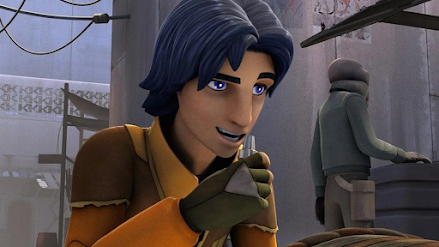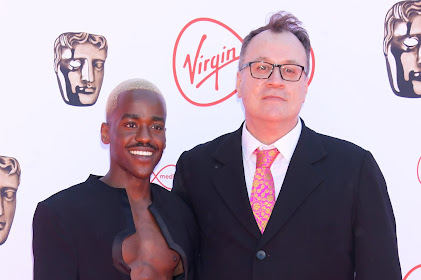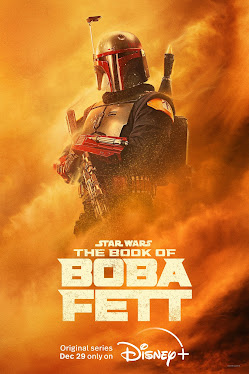The Thirteenth Doctor has regenerated into the Fourteenth, but the new Doctor is shocked to find himself wearing the same face as a prior incarnation. Returning to Earth, he is immediately reunited with former companion Donna Noble, and plunged into a sequence of events hinting at the arrival of a terrible old enemy. That threat resolved, the Fifteenth Doctor arrives to take over the mantle, and solve the mystery of Ruby Sunday.
It's fair to sat that the Chris Chibnall years of Doctor Who, spanning Series 11 - 13 of the "new" era, were divisive at best. His first season was weak, with variable writing and some dreadful episodes. Things improved, until his final run of episodes (the Flux mini-series and the splendid specials Eve of the Daleks and Power of the Doctor) was respectably solid, dragged down only by the awful Legend of the Sea Devils. But plunging ratings and dwindling audience appreciation saw the BBC decide to regroup and go in a new direction.
And that new direction was, er, an old one. Showrunner Russell T. Davies, who had brought the show back from the abyss in 2005, returned. He brought back David Tennant, the most popular of the new Doctors, with him, and also reintroduced Catherine Tate as Donna. The Doctor-Donna pairing helped make Series 4 arguably the strongest of Davies' original run.
This back-to-basics approach was hugely popular with the BBC but also appealed to Disney, coming on board as international distributor for the first time. It also helped celebrate the show's 60th anniversary in 2023 without having to resort to a "multi-Doctor special," something Davies was not keen on, despite the success it had last time out. Disney also seems to have been keen to try to get the show back to a clean slate to appeal to new viewers.
These three specials are...okay? They're certainly not the resounding back-to-form smash hit successes I think anyone was hoping for, but they're a long way from disastrous. The Star Beast - somewhat randomly - adapts a 1980 comic book story where the Doctor has to help the cute-and-helpless Meep, who turns out to be more than he seems. The result is a fun knockabout adventure, though it has to be said the forced comedic beats are torturous at best (and makes one recall that the first Davies era could have some of the cringiest humour you'd ever seen in your life, but you can overlook it for spectacular episodes like Human Nature or Blink).
Wild Blue Yonder is the trilogy's most "standard" adventure, with the Doctor and Donna arriving on an abandoned spacecraft and encountering some really odd creatures. This is an episode that, at its best, is eerie and discomforting in the way the best Doctor Who can be, and early on feels like a classic in the making. Unfortunately. the episode is let down by the idea not really being strong enough to fill 54 minutes, and some of the effects are downright woeful considering that the Disney influx of cast reportedly doubled the show's budget (the show looking cheaper visually than during the Chibnall era, despite having more resources, becomes a recurring problem). As a result the episode feels like a lot of unfulfilled potential.
The Giggle sees the return of old-school villain the Celestial Toymaker, now played with charismatic relish by Neil Patrick Harris, as he takes on the Doctor with the fate of reality at stake. The Doctor has to join forces with UNIT to take down this most cunning of opponents. This is easily the strongest of the three specials, thanks to Harris's superb performance and Davies giving him some terrific dialogue, with a deadly battle of wits between the Toymaker and the Doctor. Unfortunately, a promising and disturbing episode peters out at the end, with Davies feeling a little too clever in himself in coming up with the idea of "bigeneration," allowing the Fourteenth and Fifteenth Doctors (the latter played Ncuti Gatwa) to coexist and team up to take down the Toymaker. The end of the episode is well-intentioned with some nice lines on mental health and a brand new start for Fifteen, but it's also a bit vague and confusing. It feels like the need to introduce the Fifteenth Doctor through an unnecessary gimmick dilutes the episode of its power. Still, Gatwa makes an immediate, positive impression as the Fifteenth Doctor.
The Church on Ruby Road is the 2023 Christmas special, and the first Doctor Who Christmas special since 2017. The special introduces new companion Ruby Sunday, played with winning charisma by Millie Gibson. The storyline resolves around time-travelling musical goblins, which feels a bit random (though turns out to be part of a wider storyline about fantasy invading the scientifically plausible universe), but Gatwa and Gibson sell the hell out of it, resulting in a mostly watchable slice of nonsense. Davies also opens a mystery box about Ruby's origins, which (at this stage) intriguing and a bit eerie. However, there is a feeling here that we've done the whole "companion as a puzzle for the Doctor to solve" thing before with Clara, and that was done better. Still, an okay start to this Doctor - companion pairing.
That doesn't last long though. Space Babies is the first episode of Series 14 proper and is terrible. The Doctor and Ruby arrive on a spaceship and are chased around a bit by a terrifying monster. This is promising. They then find the spaceship is crewed by talking babies, which is...not so much. Cue lots of of horrible lip-synching and some over-enthusiastic voice acting, but it can't really overcome the weak script, poor dialogue and the laughable explanation for the monster. This is not a promising opening to proceedings.
The Devil's Chord fortunately sees an immediate improvement, with the Doctor having to face down the mysterious Maestro, an entity which can weaponise music. This intersects with a visit to 1963 where the Doctor and Ruby want to meet the Beatles and run afoul of Maestro. The ending of the episode is a little weak (despite the excuse for a fun musical number), but the deliciously evil performance of Jinkx Monsoon as Maestro strengthens the episode.
Boom sees the return of former showrunner Steven Moffat with what he does best, a conceptual episode. The concept is that the Doctor steps on a landmine and can't get off without killing himself, resulting in Ruby having to try to save the day solo. It's not Moffat's strongest work, but it's a solid enough piece about the commercialisation of warfare, with weightier themes than Davies' last few scripts.
By this point the new era of Doctor Who feels like it's off to an underwhelming start and needs a shot in the arm, and fortunately it immediately gets it in the form of 73 Yards. One of Davies' strongest-ever scripts, the episode see the Doctor vanish after stepping into a fairy circle, leaving Ruby alone, haunted by a woman who appears exactly 73 yards away from her. Whenever anyone speaks to the woman, they immediately flee in terror and disown Ruby, including her mother and members of UNIT. Unable to enter the TARDIS, Ruby goes on to live the entire rest of her life. As a high-concept piece, this is a rival to Midnight and Turn Left, falling short only because we never get a convincing reason why people scream and run away from the mystery woman, which feels like a rather large plot hole. Still, an eerie and strange episode with a great guest performance by Aneurin Barnard, and a totally dominant performance by Millie Gibson who was dropped in the deep end here (this was her first-filmed episode) and smashed it.
Dot & Bubble is another concept episode, this time the concept being that we're pretty much locked into the POV of guest character Lindy Pepper-Bean (a tremendous performance by Callie Cooke), a member of a species who spend their whole life locked in a literal social media bubble (a VR bubble that surrounds their heads with people messaging them, only rarely turning the bubble off). The metaphor is not the subtlest (though delivered a bit more cleverly than normal) but the setup makes for great tension as the Doctor and Ruby can only communicate with Lindy through IM and have to convince her of a looming alien threat and how to get to safety. The episode's concept is great, and it has an absolutely vicious sting in the tail that really caps the whole thing off, with Gatwa giving his best performance to date. The only reason the episode drops a note is that this is the second episode in a row which barely features the Doctor (an unfortunate side-effect of Gatwa's Sex Education Season 4 filming schedule overrunning), which feels a bit rough given we're still getting to know him.
Rogue is a Doctor Who-by-the-numbers story, a period piece set in 1813 with the Doctor and Ruby attending a period ball that's upset by shapeshifting aliens. There's a nice spin as a time-travelling bounty hunter (played with charismatic gusto by Jonathan Goff) shows up and thinks the Doctor is one of the aliens, leading to some tension as they try to prove their good intentions to one another whilst Ruby investigates the real aliens. The episode relies a little too heavily on the novelty of the Doctor and Rogue's flirtatious relationship (which is not as much of a novelty as Davies seems to think it is since, y'know, Captain Jack exists) rather than focusing on the primary conflict, but the pacing is good. The rest of the guest cast is outstanding as well, with Indira Varma giving a typically great performance and Camilla Aiko providing a winning turn.
The Legend of Ruby Sunday sets up the season finale with some genuinely chilling moments, as the Doctor tries to uncover the identity of Ruby's mother with cutting-edge UNIT technology. The tension and mystery builds with relish until we get to an epic cliffhanger ending, the effectiveness of which is only let down by the majority of viewers having zero idea whom the surprise bad guy actually is.
Empire of Death takes the promise of Legend and pretty much flushes it away. Legend built up a sense of genuine dread through good pacing and some eerie setpieces. Empire is just bland, rushed, confusing, illogical and defeats the returning villain with extreme rapidity. Everyone does their best with a confused script, but the episode just feels like a huge letdown.
Series 14 and its attendant specials (***½) are okay, two outstanding near-classics let down by a generally more juvenile tone than the era immediately before, and the sheer awfulness of Space Babies and Empire of Death. This isn't Russell T. Davies strutting back onto the stage to save the day with the greatest hits, its more like to play his new, late-career album which is okay, bordering on solid, but sound a bit like a 60-year-old guy trying to get down with the kids a bit too hard. The best episodes in this batch are when everyone forgets they're trying to save Doctor Who, chills out and just writes good episodes. When anyone (especially Davies) overthinks it, things start falling apart. Still, a long way from being the worst season of Doctor Who in its history, or since its reboot, and the optimism is there that maybe we can get back to the franchise at its best.
- 14X1: The Star Beast (***½)
- 14X2: Wild Blue Yonder (***½)
- 14X3: The Giggle (****)
- 14X4: The Church on Ruby Road (***½)
- 14.1: Space Babies (*½)
- 14.2: The Devil's Chord (***½)
- 14.3: Boom (****)
- 14.4: 73 Yards (****½)
- 14.5: Dot & Bubble (****½)
- 14.6: Rogue (***½)
- 14.7: The Legend of Ruby Sunday (****)
- 14.8: Empire of Death (**)













